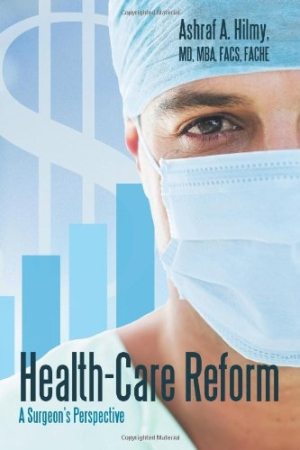Health-Care Reform
A Surgeon's Perspective
Readers who might expect a doctor’s writing to be dry and stodgy will be pleasantly surprised by Ashraf A. Hilmy’s impassioned and brutally honest personal assessment of America’s health-care challenge. Most of what is written for public consumption about health-care reform comes from journalists, politicians, and academics, and less often by health-care professionals. Health-Care Reform presents “a surgeon’s perspective.”
Hilmy, an assistant professor of surgery who is board certified in health-care administration, runs a solo surgical medical practice in Texas. Hilmy has a unique perspective on the topic of health-care reform: he has observed many health-care systems while living in various places around the world. The United States, writes Hilmy, is the only one of thirty-three developed nations that does not provide universal health care to its citizens.
Facts like this simply lay the groundwork for Hilmy’s lucid, well-written discussion of the major problems with the US health-care system. For example, Hilmy cites that “there is absolutely no incentive for physicians to limit the cost of patient encounters. In fact, it is quite the contrary. A physician is financially rewarded for doing more.”
In perhaps the most compelling chapter in the book, Hilmy recounts ten anonymous medical cases, each of which, in its own way, depicts what he calls “bad medicine.” For example, the author cites the case of a ninety-two-year-old nursing home resident who was brought into a hospital emergency room because of low blood sugar. The emergency-room doctor noticed a distended abdomen, so the doctor ordered a CAT scan and asked for a surgical consultation. He found that the patient had already had two CAT scans over the previous three months for the same reason and that no surgery was indicated. “Her encounter that day cost thousands of dollars, used up precious resources, and added nothing to her medical care,” Hilmy writes.
Hilmy has that rare ability to relate medical anecdotes in compelling narrative form without a lot of medical jargon. In addition, his clear, uncluttered writing style makes it easier to understand the complexities of American health care. While the book is short (only six chapters and a conclusion), it is highly informative and well organized, with chapters logically sequenced to cover health-care delivery, health-care costs, and health-care reform.
One cannot help but get caught up in Hilmy’s sense of moral outrage as he skewers lawmakers, pharmaceutical companies, legislators, policymakers, physicians, and even patients. While the author spares no one, his goal is not to berate others but rather to demonstrate that all participants must take responsibility for health-care reform.
In the end, with a surgeon’s precision, Hilmy offers his own formula for ways in which the health-care system can be reformed. His ideas include an emphasis on integrated medical group practice, government regulation of drug prices, radical tort reform to deter unnecessary malpractice lawsuits, and universal health insurance. This eye-opening, heartfelt work deserves the attention of every reader who cares about how to fix the ills of America’s health-care system.
Reviewed by
Barry Silverstein
Disclosure: This article is not an endorsement, but a review. The publisher of this book provided free copies of the book and paid a small fee to have their book reviewed by a professional reviewer. Foreword Reviews and Clarion Reviews make no guarantee that the publisher will receive a positive review. Foreword Magazine, Inc. is disclosing this in accordance with the Federal Trade Commission’s 16 CFR, Part 255.

